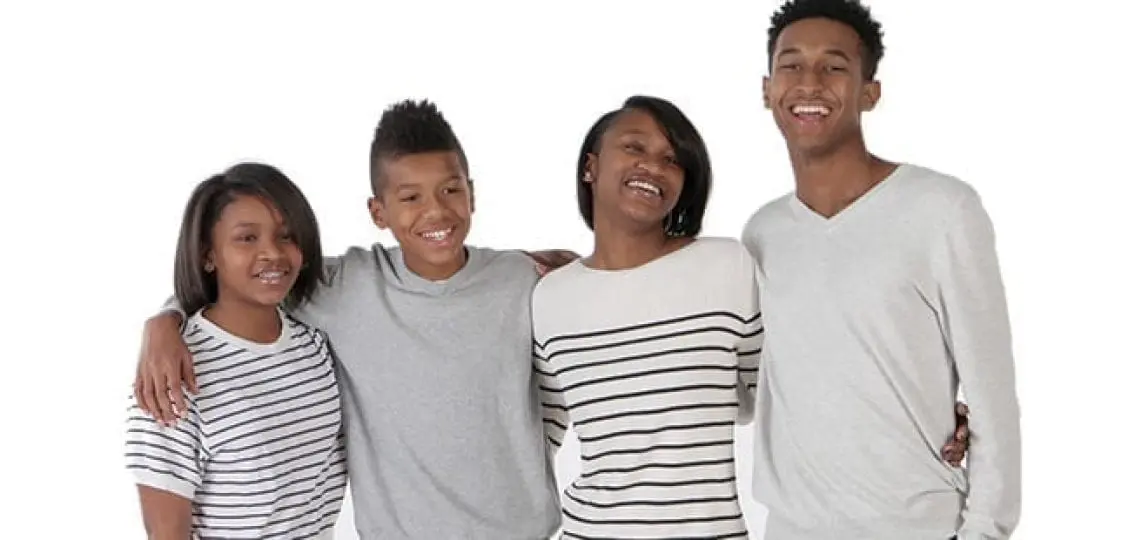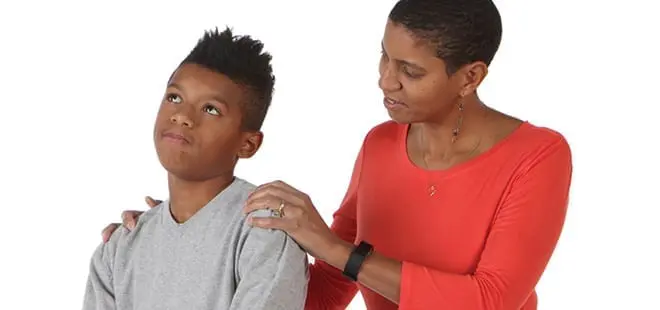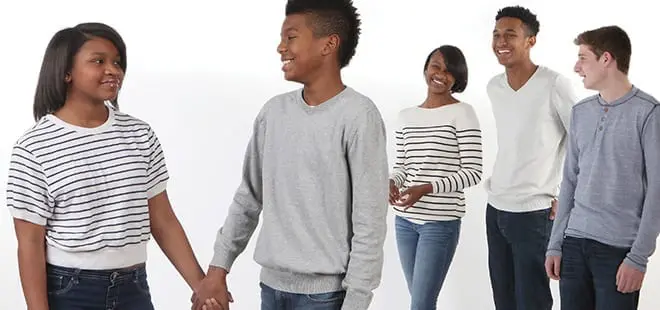While an 18-year-old guest cheerfully helped me with the dishes one night, my 13-year-old son, who had remained silent and surly during dinner, dropped his plate in the sink and walked past us without so much as a grunt.
“Don’t worry,” said the sage guest, sensing my distress. “He’ll be back,” he assured me, promising that by 17, my son would reconnect to the family.
Without realizing it, the older teen had schooled me on a typical stage of social development—the period when adolescents often distance themselves from the family unit. Family is the most important influence and social group for children, but relationships shift in adolescence as teens and tweens struggle toward independence and try to establish their identity as individuals, according to the American Pediatric Association.
This shift away from family and toward peers is normal. But whether it’s subtle or dramatic, it can be “kind of a shock to parents,” says Dave Walsh, a psychologist and author of Why Do They Act That Way: A Survival Guide to the Adolescent Brain for You and Your Teen.
“A lot of times, kids in the preteen years enjoy doing things together with their parents. Then come the teenage years and it often seems like they don’t want to have anything to do with their parents,” Walsh explains. “Part of that is very appropriate developmentally, but it can be difficult for the parents.”
When your teen chooses peers over you, don’t let it hurt your feelings.
According to “The Teen Years Explained,” a Johns Hopkins University guide to teen development, adolescent brains perceive social acceptance from peers to be as rewarding as eating ice cream. And what parent can compete with that?
We can’t leave you hanging. So here’s advice about adolescent social development and a guide to some changes you can anticipate during the tween and teen years.
How Family Relationships Change
During the Tween Years
Many tweens swing between seeking closeness with their parents and being in conflict with them. Although your tweens are still dependent on you, they may start to withhold information, avoid family excursions, and dodge previously cherished siblings. Many will begin to confide more in friends, favor private time in their rooms, and spend interminable stretches on social media, says Dona Matthews, a psycho-educational consultant who blogs about adolescence for Psychology Today.
“Some tweens are very angry and sullen and rude with their family,” says Matthews, who is also the author of Beyond Intelligence: Secrets for Raising Happily Productive Kids. “They close up, they go to their rooms and say ‘I never want to see you again.’ Others are lovely through the tween years, so you get this full spectrum.”
During the Teen Years
Even parents who think of their teen as a best friend should assume they’ll spend less time together. Parents will experience some pushback as the teen asserts independence and becomes more involved with school activities. Think of this as a good thing, says Jill Emanuele, a clinical psychologist and vice president of clinical training at New York City’s Child Mind Institute.
“There are some teens who are attached at the hip to their parent throughout their whole entire childhood, and that’s an extreme that’s not so great,” she says. “You want them to become more independent, functioning on their own, being able to manage their social interactions, their shower, their homework.”
While it’s normal for your adolescent to push you away—and you should loosen your hold—don’t let go completely, adds Walsh. They still need you, even if they sometimes don’t realize it. “The kid’s job is to ask for a divorce,” Walsh explains. “A lot of parents make the mistake of granting the divorce. The art of parenting teenagers is to figure out new ways to stay involved.”
Tip: Help your adolescent understand that disagreements are okay. Use conflicts to model how to respectfully and thoughtfully present different points of view.
Remember: Some sullen behavior is normal, but sudden or prolonged changes in appetite and sleep patterns, complete withdrawal from family or friends, and extended periods of melancholy could indicate depression, substance abuse, or other problems, cautions Emanuele.
How Friendships Change
During the Tween Years
When your tween dumps you for a new crew, they’ll probably experiment with a variety of new relationships—and the process may be dizzying as they try to figure out where they belong.
“In middle school, you see a lot of shifting friendships with different friend groups,” Emanuele says. “You see kids really struggling to figure out who they are and searching to find a peer group that really matches them.”
Tweens generally choose same-gender friends, and relationships become newly intense as their brains mature and “allow them to genuinely care for each other in a way that younger children just can’t do,” says Matthews.
“You’ll see the child working hard to have sustaining relationships with friends,” she says.
“Their hearts will be broken when friends betray them or leave them behind in order to make friends with other people.”
As peers become more important, so does the need to conform, adds Walsh. “Tweens and teens will often do things with their peers that they wouldn’t do on their own,” Walsh says. “The audience for the tween and teenager is the peer group, and that’s often whom they’re trying to please—and that becomes a lot more important than pleasing parents or a teacher.”
This tendency toward group think among tweens contributes to the formation of cliques and can lead to bullying, says Walsh. And while this age group is particularly susceptible to bullying, tweens are more likely to participate in bullying than to be victims.
“For every one victim there are multiple perpetrators,” Walsh says. “It often happens in groups. This doesn’t mean these kids are bad kids. It means they’re going along with the group, and the pressure to conform with the group becomes very, very great.”
During the Teen Years
Friend groups tend to settle after the tween years, and young teens will often stick with one group of friends. Call them cliques or tribes. These social groups seem most evident during the teen years, but they’re part of human behavior at all ages, says Emanuele.
By about 14, your teen may begin to refine their relationships and connect more with those who share common interests, Matthews says. Older teens still hang out in large groups, but often gravitate toward intimate relationships with one or two friends. Don’t worry too much about how many friends your teen has or whether they are popular.
In fact, popular teens are more likely to engage in risky behaviors.
“Teens will experiment and get involved with peer groups where they egg each other on and try drugs, try alcohol, and it’s up to the parent to protect their child and put restrictions on those things,” adds Emanuele. Though they are gaining independence, the teen years do not mean it’s time to grant complete freedom.
Get to know your teen’s friends and, according to your family’s values, set limits on what your kid can do, where they can do it, and with whom.
Tip: If you disapprove of your teen’s friends, don’t criticize them directly because your teen will feel compelled to defend them, advises Walsh. Instead, address unsafe behaviors in terms of your family’s values and beliefs.
Remember: The number of friends your adolescent has is less important than whether they seem happy with those relationships. However, if it seems your adolescent has no friends, encourage them to join clubs, teams, or extracurriculars. This will expose them to peers with similar interests.
How Romantic Relationships Change
During the Tween Years
If tweens are dating at all, they will usually hang out as a pair within a group of friends that all go out together as a crowd.
At this stage, tweens are “trying dating on for size,” says Emanuele. Some couples will simply announce that they’re “going out” without any other sign of actual dating. But a few may peel off from the group to experiment sexually.
“You can have kids who get pretty sexually involved at a very young age, well beyond an understanding of what they’re really doing, and that’s very concerning,” cautions Emanuele.
During the Teen Years
Older teens may casually date or engage in long-term monogamous relationships. While it may be hard to see your teen grow up—and you worry about them becoming sexually active—remember that dating helps adolescents understand their sexuality, expand their social skills, and learn how to manage intimate connections.
“You want them to be exploring relationships and how they work, finding out why they’re hard, what works better, and how to be in a relationship,” counsels Matthews.
It’s perfectly okay, too, if your teen isn’t yet interested in romance. Don’t push.
If your teen falls head over heels, try not to cringe or roll your eyes at their mooning, and treat their relationship with respect. Just make sure you’re alert to the signs of an unhealthy liaison.
“People can get so involved with the person they’re dating that they start to lose themselves a little bit,” warns Emanuele. “They might get involved with a person who’s controlling or abusive, and a lot of kids haven’t been educated about what that looks like or what the warning signs are. If your kid starts to hang around one person and is isolated and stops hanging out with their other friends, that’s concerning.”
Tip: Banning a specific relationship outright often leads to rebellion. Work with your teen—and perhaps a counselor—to reach a solution.
Remember: Teen breakups aren’t trivial. They represent a serious loss to your teen and can trigger depressive episodes or even suicide attempts.







